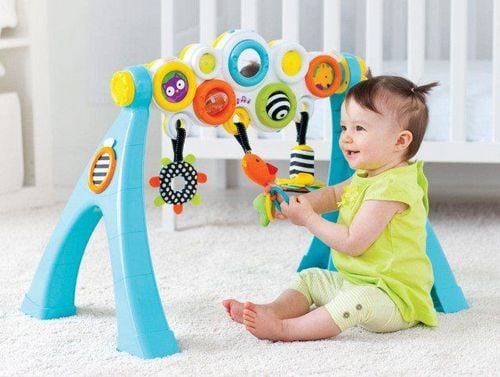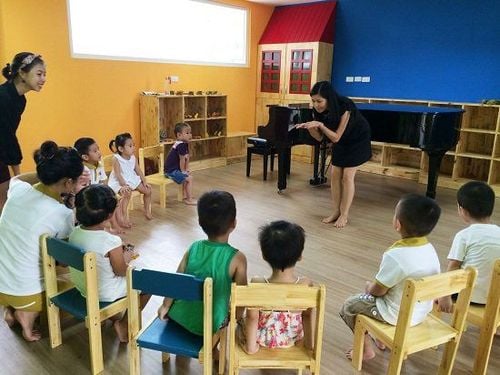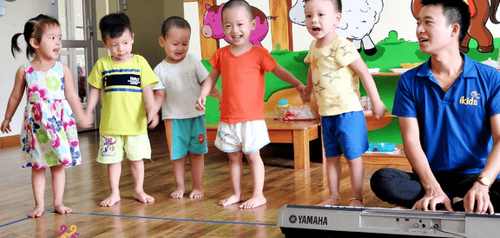This is an automatically translated article.
The article was professionally consulted by Dr. Le Thu Phuong - Department of Pediatrics - Neonatology - Vinmec Hai Phong International General Hospital.You may have noticed that your child has a gift for music, he enjoys the collection of music you are listening to, he dances to the rhythm of the song and just a harmonica is enough for him to hum throughout. day. Want to nurture your child's latent musical talent, but don't know how to do it without putting too much pressure on your child too soon?
First, children need to be exposed to music regularly, even if your child has already shown a clear gift. Children can distinguish melody, rhythm, tempo and pitch of music. Children learn best through exploration, which they find more enjoyable than formal exercises and lessons like mastering sounds.
Here are 11 ways to encourage your preschooler to develop musical talents.
1. Play some tunes that aren't meant for children
When you play music at home and in your car, don't just look for children's collections or children's soundtracks. Preschoolers can also appreciate classical, jazz, folk, funk, punk, rock, reggae, rap, hip-hop, or techno tunes. Just turn the volume down and listen to the music before letting your child listen. Children will hear the lyrics, so make sure there's nothing in the lyrics that you don't want to have to explain.Exposing children to a variety of music will help them learn to distinguish differences in timbre, pitch, rhythm, and emotion. It also helps children develop the ability to focus on music.
Musically gifted children often enjoy exploring a variety of sounds, even if they belong to different musical genres. From the sound of the piano, jingle or environmental noises such as bells, waterfalls, rain on the roof or crickets chirping all delight children.

Những đứa trẻ có năng khiếu âm nhạc thường rất thích khám phá những âm thanh đa dạng
2. Expand your definition of children's music
Your definition of music for children may be limited to children's songs, Vietnamese songs. That's really not good for your child's musical development. You need to change the way you look at music for children.You can check out the music collection at Putumayo Kids, which is a website that aggregates Brazilian, Celtic, African and other global rhythms. This site is a good place to start looking for sounds from faraway places.
Kids Blog 'Music That Rocks' promises to bring music for kids without making the adults want to leave their hair on the back of their necks, and Classics for Kids offers ideas on incorporating music into family life.
3. Be patient with your child's repeated requests
Your child can ask to hear the same song over and over again. Repetition helps preschoolers master the rhythm and distinguish the tones of songs.Therefore, play the song your child asked for as long as you can stand it. The day will come when your baby will say he doesn't like listening to that song anymore and ask you to switch to another song.
4. Sing to your child
Sing to your child, whether it's a bedtime lullaby, or your favorite songs. Chances are, your child will start singing along with you.Don't worry if you can't keep a tune. It's good for children to learn that singing doesn't seem to have to be perfect, like it is on records, in order for them to become a shining talent later on. The fact that you sing incorrectly also makes children not afraid to try singing.
5. Clean your guitar and strum a tune
Choose your own instrument, great if you play and encourage your child to sing along, dance or take turns. Preschoolers can begin to imitate you by playing the guitar, practicing the guitar, or clapping their hands to the music.Making music with your child can be a fun bonding experience and if you show them that music is part of everyday life, they can start making their own sounds. Like the artist's parents Yo-Yo Ma played music at home, thereby encouraging the artist Yo-Yo Ma to develop his musical talent.

Lau sạch cây đàn ghita của bạn và gảy một giai điệu cho trẻ lắng nghe
6. Find musical instruments designed for children
Toy stores or music stores are good places to find musical instruments that are small enough to be suitable for children. Guitars, organs, sets of bells and maracas, as well as drums can all be things that children enjoy playing. The harmonica and ukulele are also good, economical options for you.International merchandise stores often offer lesser known, kid-friendly musical instruments from around the globe. These can also often be resold after being used, which is a great way to save money and still expose children to a variety of musical instruments.
Encourage your child to try larger, life-sized tools too, even if they feel a bit frustrated. If you find that your child loves a particular musical instrument, such as your piano, consider buying her own baby-sized version of that instrument.
7. Making musical instruments at home
You can use whatever you have on hand to make musical instruments for your child. For example:Pour dried beans, lentils or coins into a plastic water bottle or film container to make a shaker. Turn rubber bands and a shoebox into a banjo. The upside down coffee cans and boxes make a great drum set. Metal pot lids work as effectively as cymbals. By creating musical instruments, you'll help your child see that music is everywhere, not just in traditional settings like classrooms or concerts, but in everyday activities. family day.

Bằng cách tạo ra nhạc bằng xoong, nồi,... bạn sẽ giúp trẻ nhận thấy âm nhạc có mặt ở mọi nơi
8. Take your child to a music class
You can search for music classes for your child on the web, or ask friends or other parents in your child's kindergarten. Find a class where your child learns a variety of clapping, singing, dancing, percussion, and marching movements.Children will find it more interesting if parents also participate in the class with them, such as singing with the child, parent-child interaction and the use of simple instruments such as rods and cymbals. Enjoy the laid-back vibe where you're having a good time, not that you'll be the next musical prodigy in the family.
9. Watch child-centered music events
A concert at night at the symphony hall can be a disaster for preschoolers. In fact, there are plenty of kid-friendly musical performances at museums, libraries, parks, and bookstores.At some shows, musicians welcome kids to see what they're up to. Some even let kids try out musical instruments. Outdoor concerts are great for preschoolers who want to hang out and listen to fun beats.
Several symphonies open rehearsals to the public. This is less formal than a concert and can show your child that even the pros have to practice hard and sometimes have to rehearse in order to play better at concerts.
10. Let your child's interests guide you
If all the child wants to do is dance, then continue the dance rhythms. If singing is your child's hobby, encourage her to sing along to her favorite lyrics and record her voice so she can hear herself sing.You can also organize a family concert or karaoke night for a kid who loves to perform. Maybe your child will enjoy it more if other children join him in the performance.
11. Sign up for music classes for kids

Bạn có thể đăng ký cho con bạn các lớp dạy nhạc cho trẻ em
The piano can be a good instrument for a child to start with, as it is easy and quick for a child to learn how to make a melody on it. If your child is still learning, try using a digital keyboard. Children can navigate it more easily than a piano and you will be able to control the volume.
Find an instructor with experience in teaching music to young children who knows how to keep things working correctly and most importantly, makes the whole experience simple and enjoyable.
Nurturing children's talents is a necessary and important job, if you need specific advice and guidance, please visit the child psychologists at Vinmec BV. Here, with psychological tests and development assessment tests, experts will personalize each child, to provide a suitable training schedule for children to develop comprehensively without any pressure. due to excessive expectations.
Please regularly visit Vinmec.com website and update useful information to take care of your baby and family.
Reference source: babycenter.com














